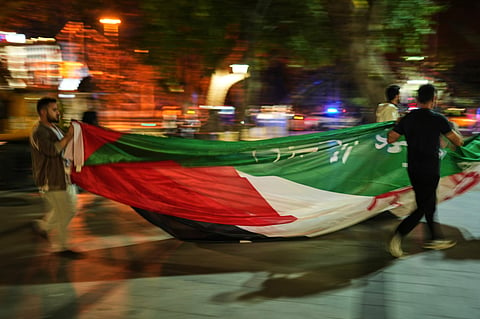After Qatar strike, could Turkey be Israel’s next Hamas target?
Analysts and officials warn Nato may not shield Ankara from Israeli action

Dubai: The recent Israeli strike on Hamas leaders in Qatar has rattled the region, raising fears that Turkey could be the next target in Israel’s widening campaign against the Palestinian group.
Analysts and officials warn that Ankara’s Nato membership may not provide the shield it believes against Israeli action.
From Doha to Ankara: A shift in focus
On September 9, Israeli jets bombed a Hamas meeting in Doha, killing six. The attack shocked many who assumed Qatar’s role as mediator — and its status as a major non-Nato ally of the United States — would protect it from Israeli firepower. It did not.
Within hours, pro-Israel voices in Washington and Jerusalem turned their attention to Turkey.
Michael Rubin of the American Enterprise Institute warned that Ankara could be next, stressing that “Nato membership is no guarantee of protection.” On social media, Israeli academic Meir Masri was more blunt: “Today Qatar, tomorrow Turkey.”
The rhetoric sparked a furious reaction from Ankara. A senior adviser to President Recep Tayyip Erdoğan lashed out, calling Israel a “dog of Zionism” and threatening that its “erasure from the map” would bring peace to the world.
Israel’s long memory of retaliation
History suggests that distance and sovereignty have never deterred Israel. After the 1972 Munich Olympics massacre, its operatives hunted down the perpetrators across Europe and the Middle East.
In 1985, Israeli jets flew 1,280 miles (about 2,060 km) to bomb the Palestine Liberation Organisation headquarters in Tunisia, a country that — like Qatar — had no formal ties with Israel.
Turkey under the spotlight
For months, pro-Israel commentators have branded Turkey “Israel’s most dangerous enemy,” citing its support for Hamas, its growing clout in the eastern Mediterranean, and its influence in post-war Syria. Ankara, in turn, has hardened its position. In August, Foreign Minister Hakan Fidan suspended all trade and economic ties with Israel, accusing it of “regional hegemony.”
“Turkey increasingly feels that Israeli aggression has no limits and enjoys American support,” Omer Ozkizilcik, non-resident fellow at the Atlantic Council, told Al Jazeera.
This tension is amplified by Israeli Prime Minister Benjamin Netanyahu’s open embrace of a “Greater Israel” vision, which Ankara sees as a blueprint for domination across the Middle East — directly clashing with Turkey’s own regional ambitions.
Nato’s uncertain umbrella
At the heart of the debate is whether Nato membership truly protects Turkey. Under Article V, an attack on one member is an attack on all. Yet the clause requires consensus — and consensus is far from guaranteed.
Sweden and Finland, still smarting from what they call Ankara’s “extortion” during their Nato accession, could block any collective response. The United States, Israel’s closest ally, could also veto an Article V trigger if Ankara is portrayed as a sponsor of terrorism.
“Self-defence provisions do not apply to an aggressor,” Rubin argued, framing Turkey’s sheltering of Hamas as firing the “first shot.”
Israel’s long memory of retaliation
History suggests that distance and sovereignty have never deterred Israel.
After the 1972 Munich Olympics massacre, its operatives hunted down the perpetrators across Europe and the Middle East. In 1985, Israeli jets flew over 2,000km to bomb the Palestine Liberation Organisation headquarters in Tunisia, a country that — like Qatar — had no formal ties with Israel.
For Hamas, Turkey has long been a hub. Its offices in Istanbul have reportedly been used to launder money and plan attacks. That presence, once thought secure under Nato’s umbrella, now looks increasingly vulnerable.
The road ahead
Turkey’s defence ministry has already sounded the alarm. Rear Admiral Zeki Akturk warned that Israel’s “reckless attacks” could drag the entire region into disaster. Relations between Ankara and Tel Aviv — once strategic partners — are now at their lowest point in decades, strained further by the war in Gaza and rivalry in Syria.
For Hamas, the lessons are stark. Gaza is under siege, Tehran and Doha no longer offer safe havens, and Turkey’s Nato status may prove a brittle shield.
The central thesis emerging among analysts is clear: No place is immune. Israel has shown that it will strike wherever it deems necessary, even if that risks widening the conflict into Nato territory.
Whether Israel dares to cross that line — and whether Nato would respond — may soon test the alliance’s unity as never before.




